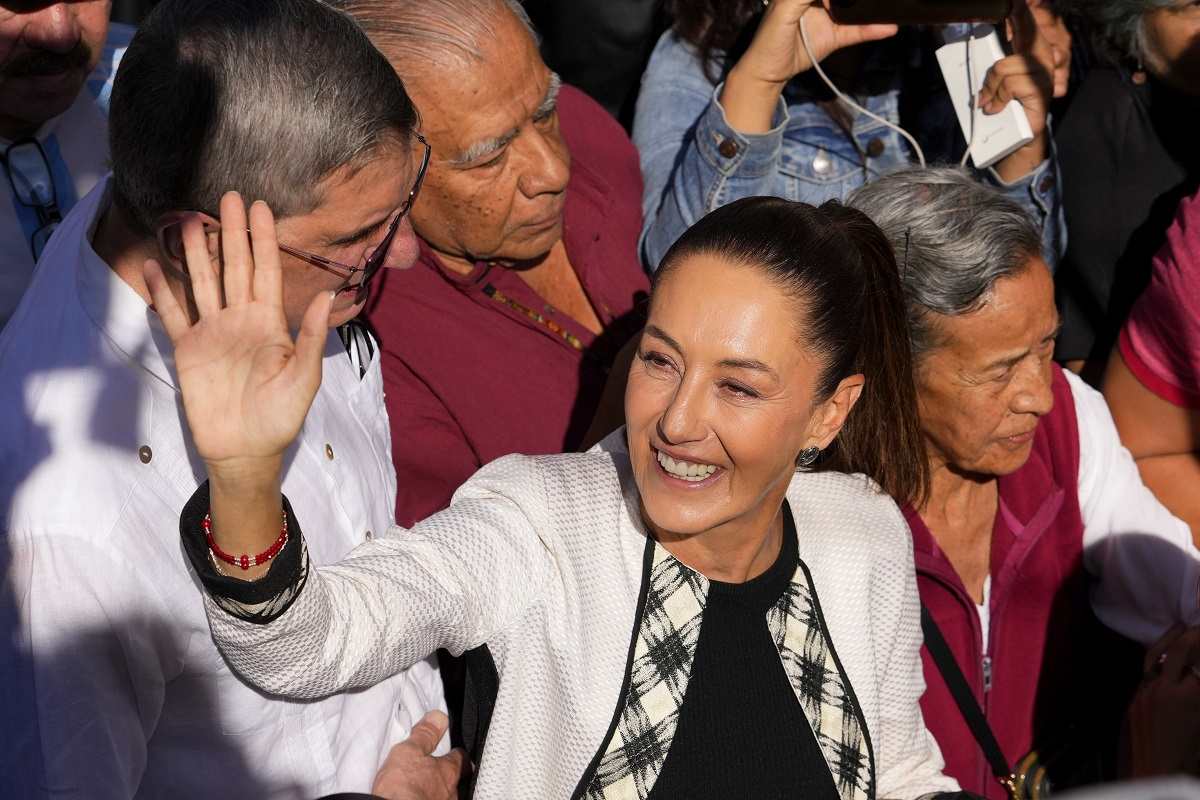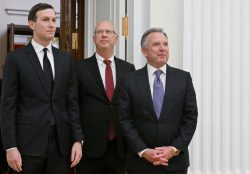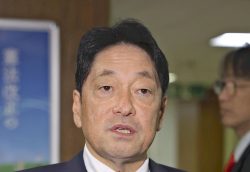Mexico Awaits Results in An Election Likely to Choose the Country’s First Female President

Ruling party presidential candidate Claudia Sheinbaum arrives to vote in general elections in Mexico City, Sunday, June 2, 2024.
10:57 JST, June 3, 2024
MEXICO CITY (AP) — Polls closed on Sunday in a national vote that will likely give Mexico its first female president, but the heat, violence and polarization continued almost right through election day.
People turned out to vote in the township of Cuitzeo, in the western state of Michoacán, despite the fact that a town council candidate was shot to death by two hitmen aboard a motorcycle just hours before the election. Residents voted under a heavy police guard — but later passed by the home of murdered candidate Israel Delgado to light a candle for the well-known local politician at an improvised altar on his doorstep.
Nationwide, the voting was largely peaceful, but it appeared that even if the front-runner — former Mexico City mayor Claudia Sheinbaum — wins, she is unlikely to enjoy the kind of unquestioning devotion that outgoing President Andrés Manuel López Obrador has enjoyed. Both belong to the ruling Morena party.
Araceli Hernández, 49, a university professor in international studies in Mexico City, said she was voting for Morena. “Even though there are things we don’t like, like militarization, there has been progress.”
Hernández was referring to López Obrador’s policy of relying on the army and the quasi-military National Guard, rather than police, to fight crime. While she was going to vote to continue the ruling party’s grip on national politics, she noted “we are going to continue to be critical” of some government policies.
Mexico City voter Yoselin Ramírez, 29, said she voted for Sheinbaum, but split her vote for other posts because she didn’t want anyone holding a strong majority.
“I don’t want everything to be occupied by the same party, so there can be a little more equality,” she said without elaborating.
The main opposition candidate, Xóchitl Gálvez, a tech entrepreneur and former senator, tried to seize on Mexicans’ concerns about security and promised to take a more aggressive approach toward organized crime.

Opposition presidential candidate Xóchitl Gálvez adjusts her hat as she waits to vote in the general election in Mexico City, Sunday, June 2, 2024.
Nearly 100 million people are registered to vote in the race to replace outgoing President Andrés Manuel López Obrador. Voters were also electing governors in nine of the country’s 32 states, and choosing candidates for both houses of Congress, thousands of mayorships and other local posts, in the biggest elections the nation has seen and ones that have been marked by violence.

Outgoing President Andrés Manuel López Obrador and first lady Beatriz Gutiérrez Müller arrive to vote during general elections in Mexico City, Sunday, June 2, 2024.
The elections are widely seen as a referendum on López Obrador, a populist who has expanded social programs but largely failed to reduce cartel violence in Mexico. His Morena party currently holds 23 of the 32 governorships and a simple majority of seats in both houses of Congress. Mexico’s constitution prohibits the president’s reelection.
Both major presidential candidates are women, and either would be Mexico’s first female president. A third candidate from a smaller party, Jorge Álvarez Máynez, trailed far behind.
Sheinbaum is running with the Morena party. Sheinbaum, who leads in the race, has promised to continue all of López Obrador’s policies, including a universal pension for the elderly and a program that pays youths to apprentice.
Gálvez, whose father was Indigenous Otomi, rose from selling snacks on the street in her poor hometown to start her own tech firms. A candidate running with a coalition of major opposition parties, she left the Senate last year to focus her ire on López Obrador’s decision to avoid confronting the drug cartels through his “hugs not bullets” policy. She has pledged to more aggressively go after criminals.
The persistent cartel violence, along with Mexico’s middling economic performance, are the main issues on voters’ minds.
Julio García, a Mexico City office worker, said he was voting for the opposition in Mexico City’s central San Rafael neighborhood. “They’ve robbed me twice at gunpoint. You have to change direction, change leadership,” the 34-year-old said. “Continuing the same way, we’re going to become Venezuela.”
On the fringes of Mexico City in the neighborhood of San Andres Totoltepec, electoral officials filed past 34-year-old homemaker Stephania Navarrete, who watched dozens of cameramen and electoral officials gathering where frontrunner Claudia Sheinbaum was set to vote.
Navarrete said she planned to vote for Sheinbaum despite her own doubts about López Obrador and his party.
“Having a woman president, for me as a Mexican woman, it’s going to be like before when for the simple fact that you say you are a woman you’re limited to certain professions. Not anymore.”
She said the social programs of Sheinbaum’s mentor were crucial, but that deterioration of cartel violence in the past few years was her primary concern in this election.
“That is something that they have to focus more on,” she said. “For me security is the major challenge. They said they were going to lower the levels of crime, but no, it was the opposite, they shot up. Obviously, I don’t completely blame the president, but it is in a certain way his responsibility.”
In Iztapalapa, Mexico City’s largest borough, Angelina Jiménez, a 76-year-old homemaker, said she came to vote “to end this inept government that says we’re doing well and (still) there are so many dead.”
She said the violence plaguing Mexico really worried her so she planned to vote for opposition candidate Xóchitl Gálvez, who has promised to take on the cartels. “(López Obrador) says we’re better and it’s not true. We’re worse.”
López Obrador claims to have reduced historically high homicide levels by 20% since he took office in December 2018. But that’s largely a claim based on a questionable reading of statistics; the real homicide rate appears to have declined by only about 4% in six years.
Just as the upcoming November rematch between Biden and Trump has underscored deep divisions in the U.S., Sunday’s election has revealed how severely polarized public opinion is in Mexico over the direction of the country, including its security strategy and how to grow the economy.
Beyond the fight for control of Congress, the race for Mexico City — whose top post is now considered equivalent to a governorship — is also important. Sheinbaum is just the latest of many Mexico City mayors, including López Obrador, who went on to run for president. Governorships in large, populous states such as Veracruz and Jalisco are also drawing interest.
Polls opened at 8 a.m. and close at 6 p.m. (0000 GMT Monday) in most of the country. The first preliminary, partial results are expected by 9 p.m. (0300 GMT Monday) after the last polls in different time zones close.
"News Services" POPULAR ARTICLE
-

American Playwright Jeremy O. Harris Arrested in Japan on Alleged Drug Smuggling
-

Japan’s Nikkei Stock Average as JGB Yields, Yen Rise on Rate-Hike Bets
-

Japan’s Nikkei Stock Average Licks Wounds after Selloff Sparked by BOJ Hike Bets (UPDATE 1)
-

Japan’s Nikkei Stock Average Buoyed by Stable Yen; SoftBank’s Slide Caps Gains (UPDATE 1)
-

Japanese Bond Yields Zoom, Stocks Slide as Rate Hike Looms
JN ACCESS RANKING
-

Keidanren Chairman Yoshinobu Tsutsui Visits Kashiwazaki-Kariwa Nuclear Power Plant; Inspects New Emergency Safety System
-

Tokyo Economic Security Forum to Hold Inaugural Meeting Amid Tense Global Environment
-

Imports of Rare Earths from China Facing Delays, May Be Caused by Deterioration of Japan-China Relations
-

University of Tokyo Professor Discusses Japanese Economic Security in Interview Ahead of Forum
-

Japan Pulls out of Vietnam Nuclear Project, Complicating Hanoi’s Power Plans
























